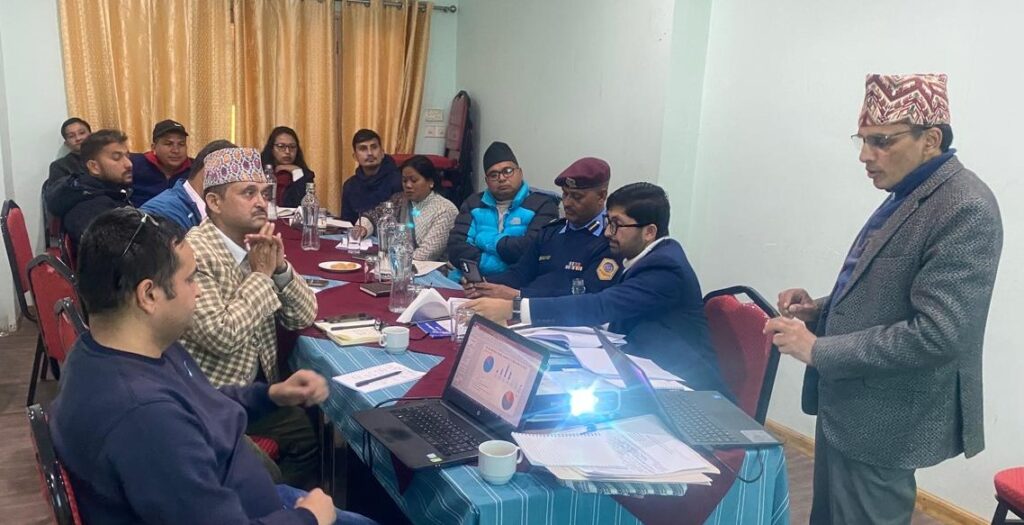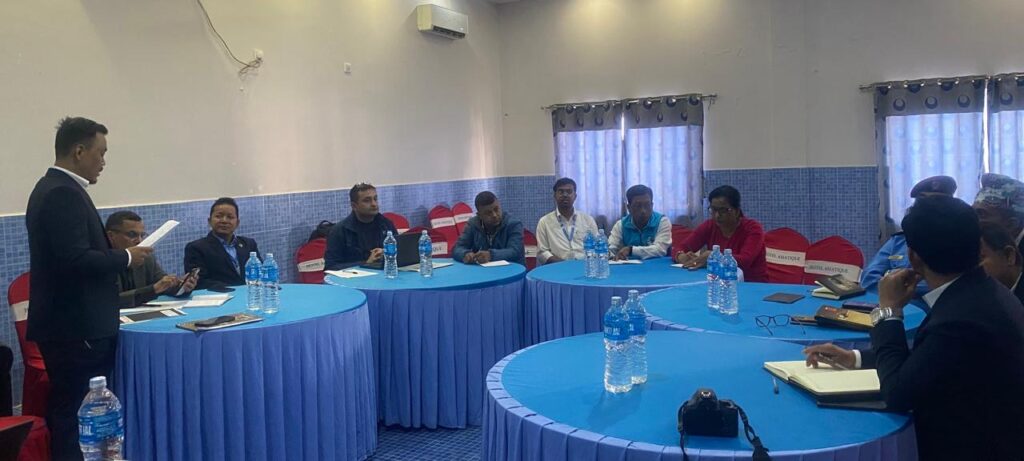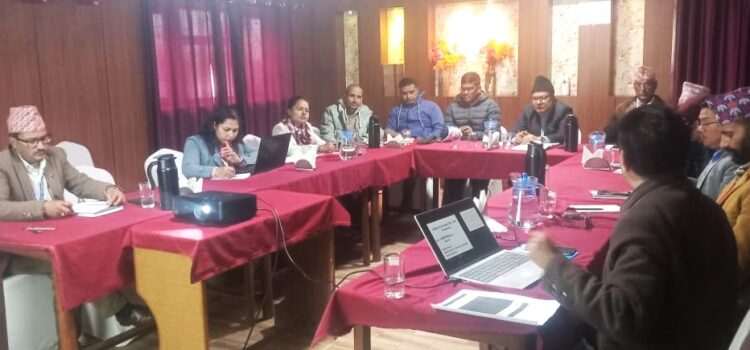The National Human Rights Commission (NHRC) conducted orientations to the province mechanisms for protection of freedom of expression (FoE) and journalists’ safety in December 2024. The orientations were organized in Koshi, Karnali and Sudurpaschim provinces.
On December 31, NHRC Karnali Province Office organized the program in Birendranagar, Surkhet. In the program chaired by NHRC Member Hon. Manoj Duwady, Ramesh Kumar Thapa, NHRC Chief for Karnali Province, gave brief introduction about the composition of mechanism in the province to safeguard FoE. He also informed that the mechanism conducts periodic meetings and emergency meeting whenever required based on incidents of FoE violations in the Province.
Hon. Duwady, also the coordinator of Direction Committee for Protection and Promotion of FoE, underscored the importance of having appropriate laws to protect FoE for both citizens and journalists. “FoE is a paramount right because it enables the realization of other rights so it is imperative for all stakeholders to work toward its protection,” he stressed.
Nanu Maiya Khadka shared Freedom Forum’s monitoring report and data for incidents of foe violation in the province. According to her, 40 incidents of violations were recorded in the province have been recorded over the past five years. She emphasized that investigative journalists, in particular, face a higher risk of attacks and threats for covering news on corruption at local levels.
NHRC Secretary Murari Kharel shared his presentation on national and international provisions on FoE. “While individuals are subjected to violence merely for expressing their opinions; journalists, in particular, are the most affected when it comes to FoE. The Directive is brought to address these challenges, identify threats, vulnerabilities and act to reduce the threats,” he reminded.
Vice Chairperson at High Court Bar Association, Surkhet, Narayan Nath Yogi, remarked that not only journalists, advocates are also targeted for practicing FoE during court hearings. “We are always in fear of what citizens’ reaction might be after the court hearing”, he worried.
Deputy Superintendent of Police (DSP) Narayan Dhami from the Karnali Province Police Office highlighted the necessity of strengthening all police units to safeguard FoE. He mentioned that the mechanism established to advance human rights protection will be helpful to bring forth issues regarding FoE in the province.
President of the Federation of Nepali Journalists (FNJ) Karnali Province Bishnu Sharma and President of FNJ Surkhet, Sushil Sharma, noted that social media had become increasingly challenging platforms for journalists in recent times. They highlighted professional and economic sustainability of media and journalists as major problems in the province and suggested the need for a collaborative effort to safeguard FoE.
FF’s representative for Karnali Province Laxmi Bhandari highlighted the need for capacity building of members of the mechanism for effective action.

On the same day, NHRC Sudurpaschim Province Office also conducted orientation in Dhangadhi. The program started with presentation of Joint Secretary Yagya Raj Adhikari. He shared salient features of FoE as mentioned in UDHR, ICCPR and other national and international instruments. Lately, “Threat is increasing for exercise of FoE through digital platforms,” he said.
Highlighting the need of province mechanism, he instructed the mechanism members to work in unison by learning the key issues of FoE and journalists’ rights.
Similarly, Narayan Ghimire viewed the collaboration of NHRC with security agency, government and CSO for the rights of journalists and protection of FoE was commendable initiative. Presenting trend of FoE violation and challenges, he said shared work would help resolve problems.
President of FNJ Sudurpaschim Province Bharat Shah reiterated that murder of Suresh Bhul was not merely due to theft of goat but is related to his profession. Seconding him, NHRC Province Office’s Chief Joint Secretary Prakash Dutta Bhatta informed that the province mechanism had been monitoring Bhul’s case and also wrote to all concerned agencies to cooperate the investigation. FF’s representative for the province, Min Bam, urged the NHRC’s central office to prod province offices for more proactive actions and continuation of works.
Earlier, similar orientation was held in Koshi Province on December 2. The orientation was attended by province mechanism members, NHRC central office representatives. Freedom Forum had facilitated the orientations, especially on the monitoring of FoE violation and journalists’ safety in the country.

At the program, NHRC’s Joint Secretary Yagya Prasad Adhikari reminded the objective of the formation of provincial mechanisms. He underlined the need for protecting FoE and journalists’ rights, for which the mechanism at central and province levels would work in close coordination. “FoE is the fundamental of all other fundamental rights ensured in constitution, but journalists are still targeted by state and non-state actors for their reporting. So, the mechanism is formed as a shared responsibility of all stakeholders which is first of its kind in South Asia,” he stressed.
Bir Bahadur Budhamagar, Head of NHRC Koshi Province Office, made a brief presentation on status of freedom of expression and journalists rights in Koshi Province. He reminded previous works of province mechanism to support journalists. But, the mechanism lacks resources to continue its works, Budhamagar informed.
On the occasion, journalist Narayan Ghimire appreciated the role played by NHRC mechanism on FoE protection and journalists’ rights with the formation of province mechanism. He also spoke on FoE violations, monitoring and trend analysis.
Assistant Attorney General Sandeep Telar from the Koshi Province Chief Attorney’s Office said that the state, non-state and individuals should be aware of limits of FoE.
Brahmadev Yadav from Federation of Nepali Journalists in Province said that capacity building of new journalists is essential in this context.
The program explored possible collaboration with other government agencies at district level for immediate rescue and regular monitoring.

